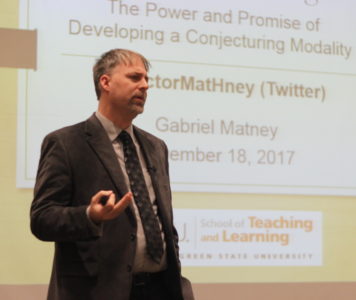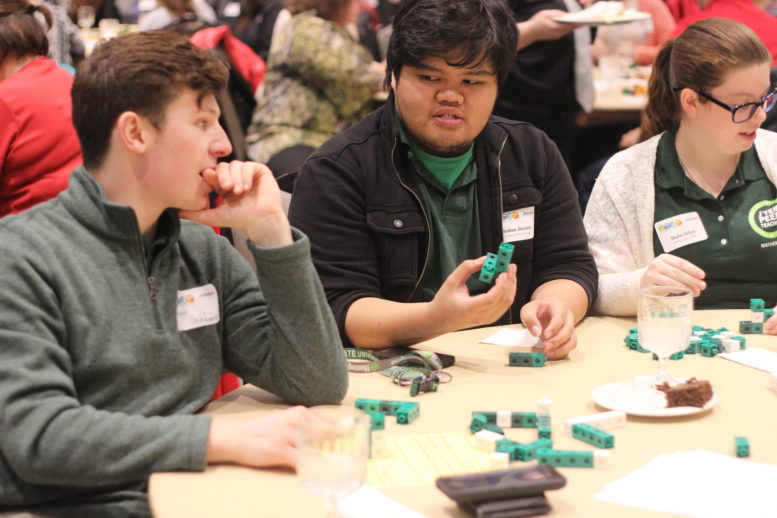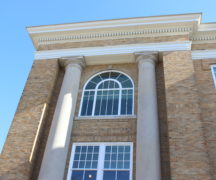By DAVID DUPONT
BG Independent News
One may have assumed a talk entitled “The Power and Promise of Developing a Conjecturing Modality” would be a bit on the dry side.

Gabriel Matney
The speaker, Gabriel Matney, an associate professor of math education at Bowling Green State University, would advise that rather than assume one should make a conjecture that the talk could instead be engaging and enlightening for the 300 or so teachers and students of mathematics in attendance at his keynote address for the Northwest Ohio Center for Excellence Symposium on STEM Teaching two weeks ago.
“Rather than assuming that we know and acting on it,” he said. It’s better to engage in “conjecturing and testing those conjectures and see if they hold or not.”
Could this talk be inspiring? Yes.
Matney explained how he made a conjecture as a teenager in love. He was dating this girl, and he conjectured that even though he could barely afford a car for himself, he could one day get her the car of her dreams.
So he asked her to describe her dream car. She detailed a purple, tricked-out Dodge Stealth. So 19 years later that girlfriend, now his wife, got that car. It did take a few years extra because it had to be specially painted purple. When delivered it was “an epic Valentine gift” born of early planning.
Conjecturing, Matney said, as powerful teaching and life tool. Matney rooted his talk in his own life. He had the audience tackle problems that he had originally posed to his three daughters, now teenagers, when they grew up.
He conjectured, he said, that “if I spoke academic language instead of common parlance, they’d be able to handle academic language.” So as a preschooler, his eldest child would spot a box and know it was a “rectangular prism,” even if she couldn’t quite get her tongue around all the syllables.
A trip to the bank with his second daughter resulted in a lesson in negative numbers. She persistently questioned him about why they were there. Matney explained to her that if they wanted to make “expenditures” they needed to deposit money so they didn’t go into negative numbers.
And he posed a challenge to the audience, to recreate a shape that was flashed onto the screen with blocks piled in the middle of their tables. He noted that when he did this with his three daughters, it was the youngest, still a preschooler, who always got it right. She would put it together and ask: “Is this it?”
She did not assume she had the answer, rather she posited what she came up with as a possible solution.
Matney recalled working for his step-father’s lawn care business. Getting from customer to customer was a challenge, given distances and traffic. This was in the days before GPS, so Matney sat with a map and carefully planned out the route taking into consideration traffic patterns. “Taking time to think about it saved us days of life.”
When he became a teacher. conjecture took a central role in his lesson plans.
Matney got a job in an inner city school in Oklahoma City. Half the violent crimes in the state took place in the school’s neighborhood, which was plagued with gangs. The students came into ninth grade with a fourth grade mastery of math. Only 26 percent of ninth graders ended up graduating. And 98 percent of the students were on free and reduced lunch.
Many people would assume they would not be able to excel in academics.
Matney conjectured they could learn, and excel.
“I’m going to believe in you,” he told students. “I’m never going to let you not believe in yourselves.” Even when students said they didn’t care, he would respond: “I do care. I’ll never let you fail.”
Matney coached the robotics team. They built a robot that cleaned toilets, and they built prosthetic limbs, and in doing so won top honors on the national level.
His students also developed plans for a training center to help adults such as their parents get the skills they needed for better jobs. And they explore the value of geodesic domes, which can withstand tornadoes better than more traditional designs.
So, Matney said, you come make assumptions based on the negative information or you could look at the students’ stellar accomplishments. “Conjecture broadens knowledge more than assumptions.”
Testing authentic conjectures improves their brains “better than any static knowledge they learn could.”
These activities help them develop “a sustainable conjecture modality within their very being,” he said. “I believe that this will allow my students to have a life of perpetual and thoughtful wonder. I want to encourage perpetual wonder. Life is too short to ever lose that.”
He urged the educators to make conjectures about all the wonderful things their students could accomplish, and then see what they create and the problems they overcome.


